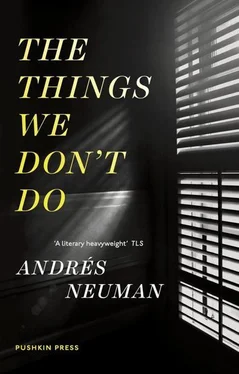My greatest regret is that Juan could have resolved two conflicts at a stroke. He is over thirty now. He lives in the house where his parents brought him up. And his salary would be enough for a single person. It is worth noting that if he did manage to take the step of moving out, he would overcome two of his biggest fears: emancipation and grief. By clinging to the family home, Juan clings not only to absent figures, but also to a regressive identity that functions as a space, a habitat. And he fears he will be out in the cold if he leaves.
I have to confess there are moments when the clinical model defeats me. During my years of practice (which are few, but very intense), I have never been caught up in such a dynamic. The patient insists on asking again and again about my own parents, interrogating me about their age, habits, health, family relations, and so on. In the most recent sessions, José has begun to analyse (I let him think he is analysing) my parents’ weaknesses, obsessed as he is with the loss of his own. It is as though, transferentially, José needed to share the burden of his orphanhood with his interlocutor.
By means of this strange projection, the patient has succeeded in visualizing more clearly his own trauma and analysing it with a degree of objectivity. Thanks to the indirect information I provide him with about himself, he in turn responds to me with greater clarity. I am not sure to what extent this strategy is permissible. But, since I began this procedure, the results have improved.
By supposedly focusing the sessions on my situation rather than his, José has become more collaborative, relinquishing his defensive posture and even appearing more self-critical. Obviously this self-criticism is limited from the outset, based as it is on a misapprehension. Although during the communicative praxis the symptoms appear positive, I keep wondering whether the patient has found in this swap a cathartic outlet, or a clever excuse to shift responsibility. I am supposed to be the one who gauges these contradictions, but that is where I acknowledge my limitations. Methodologically speaking, it isn’t hard to play José’s game. I have learned how to do it: I make a mental note of the patient’s comments, while speaking in the first person about the problems afflicting him. I wonder at what point I will be able to turn the board around and show him the real state of the game. And most of all I wonder whether, just prior to that critical moment of anagnorisis, José will give me a sign.
I intercalate two brief digressions of a personal nature.
One: while it is my genuine belief that I maintain the appropriate distance throughout our sessions, I am still concerned about the autobiographical foreshortenings I have recently been forced to take. In particular, when the patient questions me about precise details that in his case are unknown to me, and that in order to keep up the pretence of credibility oblige me to respond with a truth (or a version of the truth) about myself. In the last session, for example, José showed an interest in my father’s treatment of my pet animals. Since I knew nothing about that aspect of his childhood, I had to reply by resorting to my own experience. It was a minor detail, but it put me on my guard.
Two: if I explained the case to my father, he might be able to guide me based on his lengthy experience. But I am afraid that if I let him intervene, his help would undermine my self-esteem. My father has always had a tendency to invade my professional space in the same way that he evades his marital space. I am well aware that I have consented to those intrusions and that, ultimately, I am to blame for them. Knowing this makes me refrain. On the other hand, if in spite of everything I decided to speak to my father about José, I would be guilty of an unforgivable contradiction: encouraging my patient to escape from the father figure, while I myself regress in that respect.
Monday 14 May. The sessions continue to take place in the following way. Juan arrives at my consulting room, and, in order to be able to allude to, or possibly to elude his grief, he behaves as if he were the therapist. For my part, I try to devise as many questions and observations my role as make-believe patient permits. This dynamic has remained unchanged since the patient’s last acute crisis. If at that time I went along with this symbolic role reversal (naturally revealing nothing of a truly intimate nature, and always maintaining the distance my profession and common sense prescribe), it was because the patient soon began to talk about himself with an ease and frankness hitherto unimaginable. Although I still harbour a few misgivings about this strategy, going over my files I realize that, by comparison, the conclusions drawn from my sessions with Juan do not differ wildly from those of other patients receiving orthodox therapy. Depending on his progression over the next few weeks, I will consider whether to prolong the special treatment for a while, or return the sessions to their proper place and put the patient back on his previous medication (see prescriptions17.doc).
The monothematic nature of our exchanges presents no significant variations. When, in my role as an alleged patient showing the classic curiosity towards his or her therapist, I question him about his own personal life, Juan refers to his daily routine, taking for granted that his parents are still living. He even describes to me trivial everyday incidents in startling detail. Notwithstanding his pathology, Juan’s observations on marriage, relationships or the smugness of children are surprisingly deep and incisive. Despite my reservations, I can’t help secretly approving of many of his remarks.
To give an example, in today’s session he declared that people born in the ’70s are orphans through excess. That is to say, a generation that feels unprotected due to its parents’ overprotectiveness. Juan and I belong more or less to the same generation, and I, too, am an only child. This fact occasionally contributes to my being momentarily distracted from his case and referring back to my own experience, which further complicates the difficult balancing act our game of role reversal forces me to maintain. I mention these small interferences in my communication with my patient in order to be aware of them.
At times, José shows signs of worsening, or at least I think I detect in him symptoms of an imminent relapse. During the last few sessions he has only been collaborating when our roles are acted out according to strict rules. Until recently I was able to steer our dialogue into a buffer zone, where, despite the premise of the game, I was able to move with relative ease and coax him into expressing himself, provided our implicit roles (he is eager to ask, I don’t mind responding) were not explicitly challenged.
Now, however, the routine is becoming complicated because José scarcely engages in digressions of a personal nature, and is inclined to resist when I pose any intimate questions. Consequently, I am limited to projecting his own anxieties in my increasingly lengthy monologues, and must be content to catch his brief remarks on the fly and swiftly analyse them. My replies are an attempt to inject the patient with a measure of reality, aware that my words produce a mirror effect in him. What is awkward from a subjective viewpoint, is that the intensification of this dynamic has led to the patient feeling he has the right to interrogate me in an increasingly impertinent way, and to address me in an exasperating tone.
Having reached this point, and when I read over my reports on our latest sessions, I begin to doubt whether playing along with José’s game was the correct thing to do. To confuse things still further, in spite of his increasing refusal to talk, the patient shows a self-possession he did not have before, and his expressions (voice, gestures, motor coordination) have become considerably calmer. I mentioned at the beginning, as the role play progressed, my suspicion that the patient might have deteriorated. However, from a strictly behavioural point of view, he seems to have improved. With regard to this apparent contradiction, I fear my limited professional experience is playing a dirty trick on me, even though I can see that this experiment is directly enhancing it. I am convinced that this audacious praxis will help me attain my father’s level more quickly, equalling if not surpassing his clinical achievements. In the meantime I still haven’t mentioned this case to him. I don’t think it is advisable. This is something I must resolve on my own.
Читать дальше












